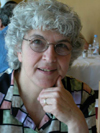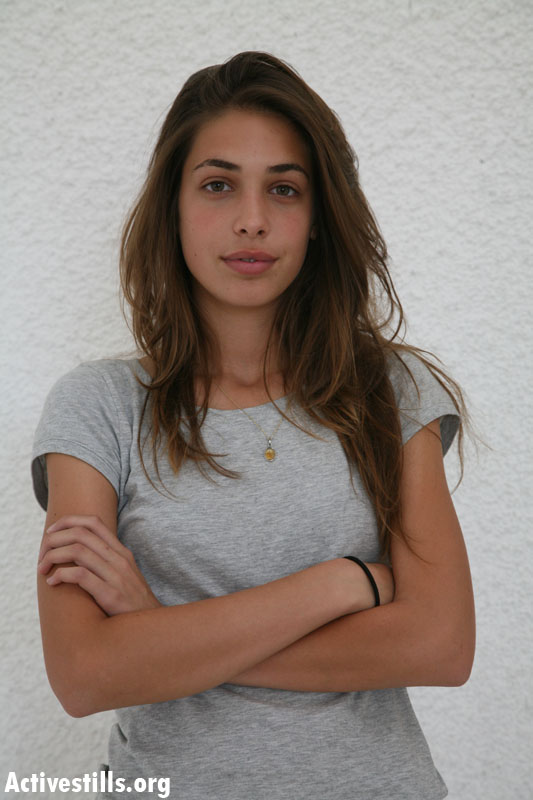
|
| Omer Goldman |
Omer Goldman:
My father was deputy head
of the Mossad, but I refuse to enlist in the Israeli military. I shall not be part of an army that needlessly implements a
violent policy and violates the most basic human rights on a daily basis.
Like most of my peers,
I too dared not question the ethics of the Israeli military. But when I visited the Occupied Territories, I realized there
was a completely different reality, a violent, oppressive, extreme reality that must be ended.
I believe in service to
the society I am part of, and that is precisely why I refuse to take part in the war crimes committed by my country. Violence
will not bring any kind of solution, and I shall not commit violence, come what may.
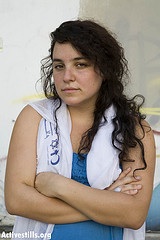
|
| Mia Tamarin |
Mia Tamarin:
I have no doubt that I
should be serving my country, I have been doing so in many ways from a very young age, and intend of course to continue doing
so, not out of compulsion, but fully and truly of my own will. I cannot become part of an organization whose purpose is to
fend off violence by violence, because this unequivocally opposes everything I believe in and my whole life. There is always
another, non-violent option, and this is the option I choose.
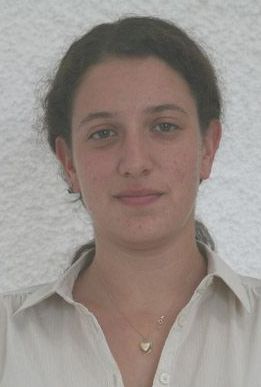
|
| Tamar Katz |
Tamar Katz:
I refuse to enlist in
the Israeli military on grounds of conscience. I am not willing to become part of an occupying army, which has been an invader
of foreign lands for decades, which perpetuates a racist regime of robbery in these lands, tyrannizes civilians, and makes
life harsh for millions under a false pretext of security.
I oppose the anti-Palestinian
policy of attrition and oppression, not because I prefer Palestinian to Israeli society, but from the understanding that this
policy has led us to a dead-end politically and morally, forced particularly on soldiers stationed in the Occupied Territories.
I am not willing to become one of those who points a gun indiscriminately at Palestinian civilians, and I do not believe that
such actions could bring change except even more antagonism and violence in our region.
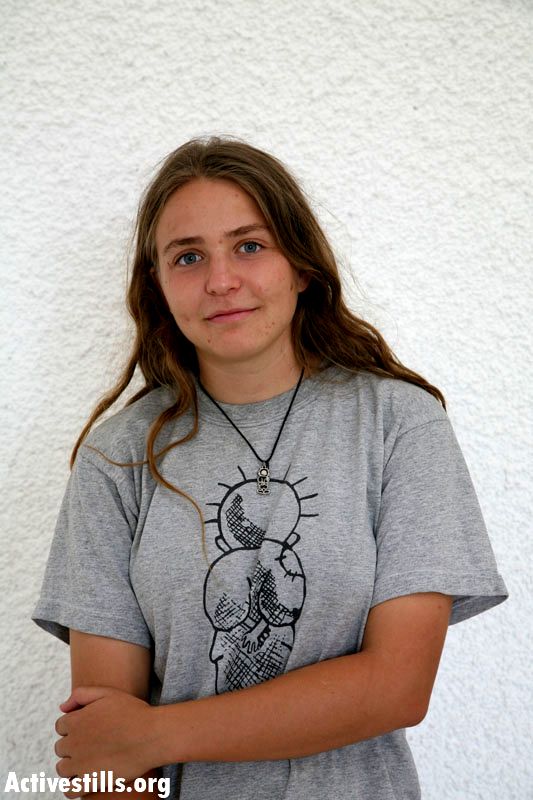
|
| Sahar Vardi |
Sahar Vardi:
I have been to the occupied
Palestinian territory many times, and even though I realize that the soldier at the checkpoint is not responsible for the
wretched policy of the oppressor toward civilians, I am unable to exempt that soldier of responsibility for his conduct ...
I mean the human responsibility of not causing suffering to another human being.
The bloody times in which
I live (assassinations, aggression, bombings, shootings) result in increasing numbers of victims on both sides. It is a vicious
circle that emanates from the fact that both sides elect to engage in violence. This choice I refuse to take part in.
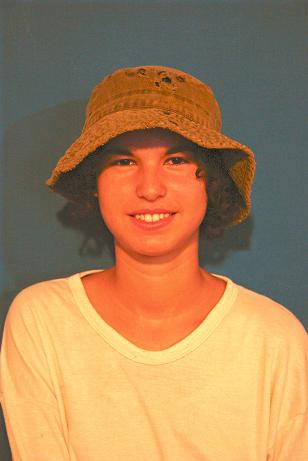
|
| Hadas Amit |
Hadas Amit:
If I were to be recruited
into the army, this would absolutely and in all respects contradict my convictions and way in life, since violence, killing,
nationalism, and vandalism are not part of them. I am not willing to wear the uniform of an organization responsible for killing
and destruction, and acting in a way detrimental to the environment. Every country, Israel included, should act by peaceful
means alone, and even if attacked, not respond with fire. In any situation, Israel included, it is wrong to maintain a military
force trained for war and killing – this is altogether contrary to the pursuit of peace and coexistence with our neighbors
in the Middle East.
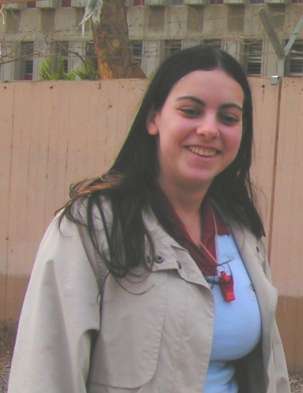
|
| Idan Khalili |
Idan Halili:
A strongly patriarchal
institution, like the army, underscores female marginality … and the superiority of male-identified values. …
It might be said that a mood of sexual harassment is endemic to … the army. And so the demand that a woman enlist is
tantamount to demanding that she cope with sexual harassment … Since the army is such a central institution in society,
a culture of sexual harassment also is exported to … civic society. … As a feminist, I feel I must avoid military
service and act to limit and reduce the influence of the army on civic society. … When men spend a formative period
of their lives in the military they are likely to receive positive reinforcements for the use of brute power and violence
… in an organization whose main values include superiority and control. … I cannot join an organization which,
either directly or indirectly, encourages violence – of any form and kind – against women. … I cannot live
in such flagrant denial of my conscience.
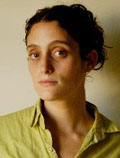
|
| Laura Milo |
Laura Milo:
I cannot take part in
the injustices that our country carries out through the IDF. I am not a pacifist;
my objection is to the occupation. I went to Yeruham [national service] with
a sense of pioneering, forming a new model of community work. Through the young
people I worked with and my personal experience, I encountered the ugliness of our society, the injustice guiding the policies
of our government. This work reinforced my sense of duty to create something
different. It is the duty of my conscience to tell my truth fully. I will refuse to serve out of a deeply personal motive: so I can go on living in this country at peace
with what my conscience tells me.

|
| Danya Vaknin in a more recent photo. |
Danya Vaknin [full text]:
At times it seems like it
would have been easier to enlist. The price of resistance is high. I’ve lost most of my friends. My friends are in the
army now. They can’t talk to me without getting angry or without dealing with a lot of emotions. I know I won’t stand for it, that I won’t accept the “no choice” outlook, that
I can’t be part of the army, that I can’t occupy, that I can’t oppress. After all, the value system I’ve
constructed clashes so clearly with serving in the IDF. Today more than ever, I have no problem saying that and really meaning
it.

|
| Tal Matalon in a more recent photo. |
Tal Matalon [full text]:
…And then Efrat
calls. "Remember Adi? Who was in our class till the middle of 11th grade? She was killed in the suicide attack."
Adi!? What!? What is she talking about?? I didn’t even say anything, just hung up and started crying. I called Netta
and told her. She came over to my place and we sat down and tried to think what we're supposed to do now. Then Barel called.
I was just trying to phone someone else. Netta answered the phone and suddenly she's sitting on the floor in my living room,
screaming. Ofer was killed too. Ofer. He studied architecture. I can't remember one person who didn’t like him. We went
to his best friend's house. His whole class was there, and most people from our year, too. I sat with some of them in the
kitchen. Everything was full of cigarette smoke and photo albums from school trips. And then one of them said that all Arabs
should be killed. And when everyone agreed, he went on and said that after we finish the Arabs off, we should kill all lefties
too. Maybe even before, so that they don't interfere. Only one of them noticed me sitting there and told him to shut up….
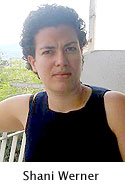
|
| Shani Werner in a more recent photo. |
Shani Werner [full text]:
…After the second
open letter from high school seniors [resisters] was published, Haggai gave an interview on TV. I was watching it as my father
walked in. When Haggai was done, my father said, “Traitors, that’s a disgrace. They should be executed.”
I reminded him that I was a draft resister, that I was doing just the same thing...
People my age are preoccupied
with the army now. They’re doing fitness training before they enlist, going to aptitude tests, medical examinations,
screenings for special units. Naturally, they talk about it all the time. They try to explain it to me, I try to take an interest.
But it feels funny all around. I was always different. Now I’m an outsider…
|
